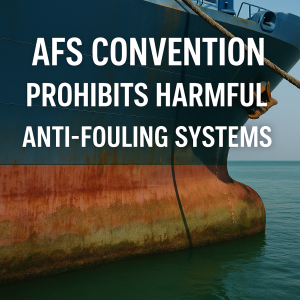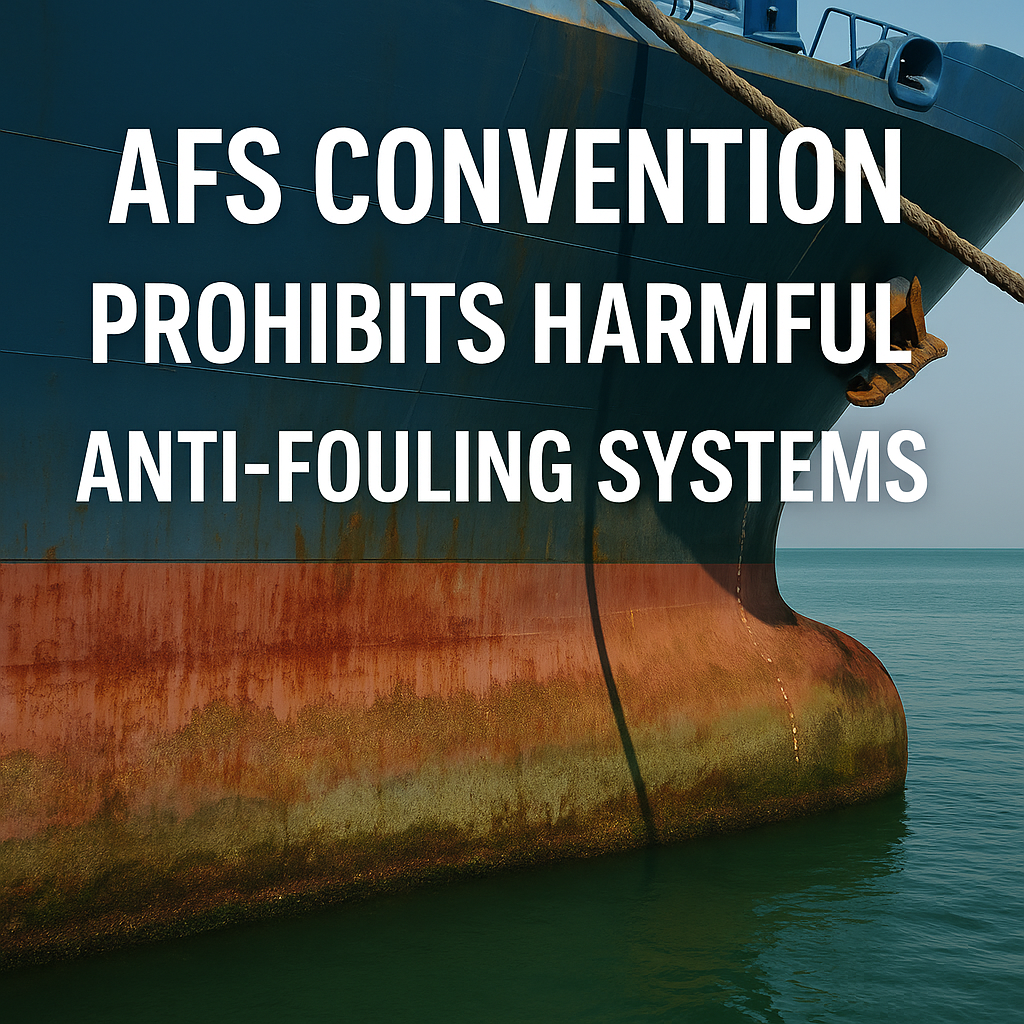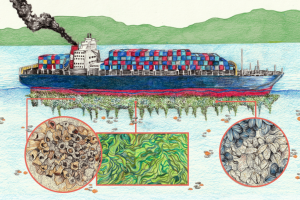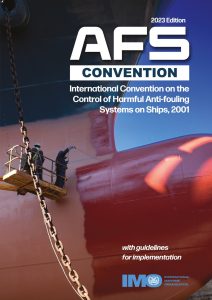Discover the top 6 reasons the AFS Convention prohibits harmful anti-fouling systems. Explore how this international regulation protects marine ecosystems, enhances ship performance, and promotes sustainable maritime practices.

Why Anti-Fouling Regulations Matter in Shipping
Marine growth, or biofouling, is a constant challenge for ship operators. Barnacles, algae, and other organisms that attach to hulls increase drag, reduce fuel efficiency, and elevate operational costs. To combat this, vessels have long used anti-fouling systems—coatings or paints that prevent organisms from sticking to ship surfaces.
But many of these coatings historically contained toxic substances, especially organotin compounds like tributyltin (TBT). These chemicals were effective—but devastating to marine life. In response, the International Maritime Organization (IMO) adopted the International Convention on the Control of Harmful Anti-Fouling Systems on Ships (AFS Convention) in 2001, which entered into force in 2008.
Here are the top six reasons why the AFS Convention bans harmful anti-fouling systems—and why it matters for shipowners, seafarers, regulators, and the planet.
1. Environmental Protection from Toxic Leaching
Harmful anti-fouling paints, particularly those containing organotins like TBT, leach toxic substances into the ocean. These compounds:
- Accumulate in marine organisms
- Disrupt the endocrine systems of fish and shellfish
- Cause shell deformities and reproductive failures
Scientific Evidence: Research published in Marine Pollution Bulletin found that even low levels of TBT could impair oyster reproduction and lead to shell malformation. Studies from Japan and France reported drastic impacts on marine biodiversity near shipyards and ports.
IMO Regulation: Under the AFS Convention, ships shall not apply or re-apply AFS containing organotin compounds that act as biocides after 1 January 2008.
2. Prevention of Bioaccumulation and Biomagnification
The chemicals used in harmful AFS don’t just disappear—they build up through the marine food web. Small plankton ingest toxins, which are then consumed by fish, seabirds, and ultimately, humans.
Analogy: Think of it like mercury in tuna. What starts as microscopic becomes a problem on your dinner plate.
Health Impacts: TBT has been shown to cause immune suppression and liver damage in marine mammals. In some studies, it’s linked to increased risks of certain cancers in animals and potential endocrine disruption in humans.
Real-World Case: Elevated TBT levels were detected in dolphin tissues near heavily trafficked coastal waters in South Korea and the Mediterranean Sea.
3. Protection of Sensitive Marine Areas and Fisheries
Many of the world’s fisheries and marine biodiversity hotspots are located near major shipping routes, harbors, and dry dock facilities—where anti-fouling paint is applied or removed.
Issue: Scraping or blasting old hull coatings during dry docking can release concentrated amounts of TBT and copper into local waters.
AFS Convention Action: It mandates that ships must ensure proper disposal of old coatings and limit contamination of sediments during maintenance.
Port Enforcement: Authorities like the European Maritime Safety Agency (EMSA) and AMSA (Australia) now require ships to carry AFS certificates and documentation proving compliance.
4. Support for Cleaner Alternatives and Innovation
The AFS Convention doesn’t just ban toxic coatings—it encourages the maritime industry to innovate. Safer alternatives now include:
- Silicone-based fouling release systems
- Non-stick fluoropolymer coatings
- Biocide-free hull treatments
Industry Example: Shipping giants like CMA CGM, NYK, and Maersk have begun applying next-generation coatings that reduce drag and cut fuel consumption without harmful leaching.
Technology Highlight: New hull-cleaning drones and UV-based anti-fouling systems are being piloted, providing zero-emission and zero-toxicity solutions.
5. Enhanced Fuel Efficiency and GHG Reduction
Biofouling significantly impacts ship performance. A moderately fouled hull can increase fuel consumption by up to 20%, according to Lloyd’s Register and the IMO GloFouling Partnership.
By regulating the use of anti-fouling systems and encouraging regular maintenance, the AFS Convention indirectly:
- Reduces greenhouse gas emissions
- Improves voyage efficiency
- Supports the IMO’s decarbonization targets
Case Study: A vessel on a 10,000-nautical-mile voyage can save up to 50 metric tons of fuel—and cut nearly 160 tons of CO₂—by maintaining a clean hull using approved coatings.
6. Standardization and Global Compliance
Before the AFS Convention, rules on anti-fouling varied between countries. This created confusion for shipowners, potential legal liabilities, and unequal enforcement.
The Convention introduced:
- Global standards for acceptable hull coatings
- AFS Certificates issued by flag states or classification societies (e.g., DNV, ClassNK)
- Port State Control (PSC) checks under Paris MoU, Tokyo MoU, and others
Recent Stats: As of 2023, over 90% of the world’s shipping tonnage operates under AFS Convention rules. Flag states and port authorities routinely inspect AFS Certificates and conduct underwater hull checks using remotely operated vehicles (ROVs).
Biofouling: Barnacles, algae and shellfish on the hulls of ships (Illustration: Ricardo Macía / China Dialogue Ocean)
Real-World Application: Biofouling in the Galápagos
In 2014, Ecuadorian authorities found invasive species clinging to hulls of visiting ships. Some had not cleaned their hulls or used proper coatings. These species threatened the fragile Galápagos ecosystem.
Following this event, Ecuador began strict enforcement of AFS rules, requiring ships to provide documentation of hull cleaning and compliant coatings before entering its protected waters.
Challenges and Ongoing Solutions
Despite progress, challenges remain:
- Emerging biocides (like copper pyrithione) are now under scrutiny
- Enforcement gaps in some regions still allow substandard practices
- Costs of switching to premium coatings may deter smaller operators
Solutions Include:
- Greater support for developing countries via the IMO-Norway GloFouling Partnership
- More accessible hull-cleaning technologies
- Regional workshops and e-learning modules supported by IMAREST and The Nautical Institute
FAQ
Q1: What is the AFS Convention?
It’s an IMO treaty that prohibits harmful anti-fouling systems and promotes safer alternatives for ship hulls.
Q2: Which coatings are banned?
All coatings containing organotin compounds that act as biocides (e.g., TBT) are banned.
Q3: How do ships prove compliance?
By carrying an AFS Certificate and a Declaration of Compliance, issued by a recognized authority.
Q4: What are acceptable alternatives?
Silicone-based fouling release systems, biocide-free coatings, and some copper-based solutions that meet regulatory thresholds.
Q5: Do these rules apply to all ships?
Yes, to all vessels over 400 GT engaged in international voyages. Smaller vessels are also encouraged to comply.
Conclusion
The AFS Convention is more than an environmental rule—it’s a statement of responsibility. By eliminating toxic anti-fouling systems, the global maritime industry is protecting biodiversity, improving efficiency, and steering toward sustainable shipping.
Understanding the six core reasons behind this ban empowers maritime professionals to make informed decisions—whether in ship maintenance, procurement, or regulatory compliance. As cleaner technologies continue to emerge, the legacy of the AFS Convention will only grow stronger.
References
- International Maritime Organization (www.imo.org)
- AFS Convention Text and Amendments (IMO Publications)
- Marine Pollution Bulletin – TBT Impact Studies
- Lloyd’s Register Fuel Efficiency Reports
- GloFouling Partnership (www.glofouling.imo.org)
- Paris MoU Annual PSC Reports
- IACS Guidelines on Coatings
- EMSA Guidance on Biofouling and AFS Compliance
- The Nautical Institute: Anti-Fouling Modules
- Inmarsat: Hull Monitoring Technologies
- UNCTAD Maritime Transport Review
- RINA and IMAREST Journals on Eco-Coatings




Thank youuuuu